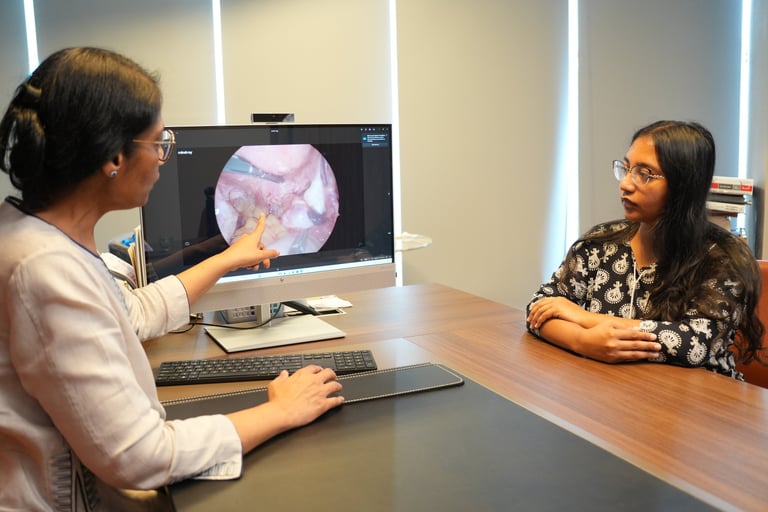PCOS Hormonal Imbalance Diet: Can Food Help You Regain Control?
Learn how a PCOS hormonal imbalance diet can help improve acne, weight gain, and irregular periods—by making smart food choices tailored to your body. You can make a huge difference!
Dr. Smita Sinha
7/13/20253 min read


Can Food Help Manage Hormonal Imbalance in PCOS?
Polycystic Ovary Syndrome (PCOS) is a common hormonal disorder affecting millions of women worldwide. Characterized by irregular periods, acne, excessive hair growth, and difficulty losing weight, PCOS is often misunderstood as merely a reproductive condition. In reality, it’s a complex endocrine disorder—and one of the key solutions lies in what you eat.
This blog explores how a PCOS hormonal imbalance diet can be a powerful tool in managing symptoms and supporting overall hormone health.
Understanding the Root of the Problem
PCOS is closely tied to insulin resistance, a condition where the body doesn’t use insulin efficiently. This leads to higher insulin levels, which in turn stimulates the ovaries to produce more androgens (male hormones like testosterone). These elevated hormone levels disrupt the menstrual cycle and cause many of the symptoms seen in PCOS.
By addressing insulin resistance through nutrition, many of these symptoms can be significantly improved. That’s where a PCOS hormonal imbalance diet comes in.
What to Include in a PCOS Hormonal Imbalance Diet
1. High-Fibre Foods
Fibre slows down digestion and the release of glucose into the bloodstream, helping to stabilize insulin levels.
Oats
Lentils and beans
Leafy greens
Cruciferous vegetables (broccoli, cauliflower, cabbage)
2. Healthy Fats
Good fats play a vital role in hormone production and anti-inflammatory processes.
Avocados
Nuts and seeds
Olive oil
Fatty fish (like salmon and mackerel)
3. Low Glycemic Index (GI) Carbs
These carbohydrates cause a slower, more gradual rise in blood sugar.
Sweet potatoes
Quinoa
Brown rice
Wholegrain bread and pasta
4. Anti-Inflammatory Foods
Chronic inflammation is common in PCOS and may worsen symptoms. Include foods such as:
Berries
Turmeric
Leafy greens
Green tea
5. Reduce Added Sugars and Processed Foods
Highly processed snacks and sugary drinks worsen insulin resistance. Swap them for whole foods whenever possible.
Personalization Is Key
No two PCOS experiences are the same. While a PCOS hormonal imbalance diet forms a strong foundation, it’s important to tailor the approach based on individual symptoms, lifestyle, and health goals. Working with a registered dietitian or healthcare professional can help in customizing a sustainable meal plan that addresses both nutrition and symptom management.
📞 Need Help?
To speak with a compassionate and experienced specialist, contact Dr. Smita, Consultant Gynaecologist at KPJ Selangor Specialist Hospital, Shah Alam.
💬 WhatsApp us at +60165833302 to book an appointment and get the personalised care you deserve.






How Diet Affects Hormones in PCOS
Blood sugar stability is crucial in managing PCOS. High-sugar or highly processed diets spike insulin levels, which worsen hormonal imbalances. A diet focused on stable blood sugar and anti-inflammatory foods can lower insulin, reduce androgen levels, and improve symptoms like acne, irregular cycles, and weight gain.
Implementing a PCOS hormonal imbalance diet is not about cutting out entire food groups but about making smarter, balanced choices that work with the body’s hormonal rhythms.


Conclusion
Food is more than fuel—it’s one of the most powerful tools in managing PCOS naturally. A PCOS hormonal imbalance diet can improve hormone regulation, support regular menstrual cycles, reduce acne and weight gain, and improve overall quality of life.
Rather than focusing on restriction, this dietary approach emphasizes nourishment, blood sugar control, and long-term balance. With the right foods and guidance, it's possible to feel more in control of your body, your hormones, and your health journey.


Contact Us
Clinic: +60355433285
Whatsapp: +60165833302
Email: smitaobgyn@gmail.com


Why Us?
About Us
Services
Endometriosis
Robotic Surgery
Articles
